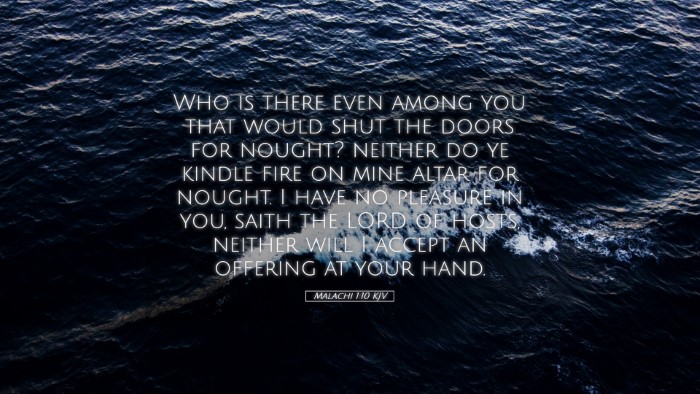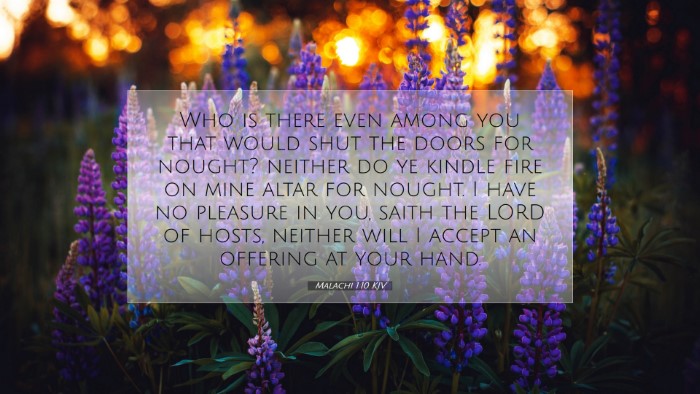Old Testament
Genesis Exodus Leviticus Numbers Deuteronomy Joshua Judges Ruth 1 Samuel 2 Samuel 1 Kings 2 Kings 1 Chronicles 2 Chronicles Ezra Nehemiah Esther Job Psalms Proverbs Ecclesiastes Song of Solomon Isaiah Jeremiah Lamentations Ezekiel Daniel Hosea Joel Amos Obadiah Jonah Micah Nahum Habakkuk Zephaniah Haggai Zechariah MalachiMalachi 1:10
Malachi 1:10 KJV
Who is there even among you that would shut the doors for nought? neither do ye kindle fire on mine altar for nought. I have no pleasure in you, saith the LORD of hosts, neither will I accept an offering at your hand.
Malachi 1:10 Bible Commentary
Commentary on Malachi 1:10
Text of the Verse: "Oh that there were one among you that would shut the doors, that ye might not kindle fire on mine altar in vain! I have no pleasure in you, saith the Lord of hosts, neither will I accept an offering at your hand."
Introduction
The book of Malachi serves as a profound commentary on the relationship between God and His people, focusing particularly on the issues of worship, offerings, and true reverence. Malachi 1:10 marks a significant moment where God expresses His disdain for empty rituals and insincere worship. This verse is not only a rebuke but also a call to genuine devotion among the people of Israel.
Exegesis and Context
Malachi, the last book of the Old Testament, addresses the social and spiritual conditions of the Israelites after their return from exile. The people had fallen into complacency, failing to meet God's standards of holiness and reverence in worship. Malachi's prophetic message is laden with questions and responses that reveal the people's insensitivity to God's desires.
Comparative Insights from Commentaries
To better understand Malachi 1:10, it is essential to draw from the thoughts of esteemed biblical commentators.
Matthew Henry's Commentary
Matthew Henry highlights that God would prefer the doors of the temple to be shut rather than to have His altar treated with contempt. He emphasizes that God is not merely concerned with the outward act of worship but the inward heart that accompanies those acts. Henry articulates that God desires sincerity in worship above all else; thus, the offerings made must reflect a genuine and humble spirit.
Albert Barnes' Notes
Albert Barnes sheds light on the nature of empty worship, noting that God finds no pleasure in the rituals performed without heart. He stresses that the offerings of the people were rejected because they were tainted by insincerity and a lack of respect for God's holiness. Barnes further points out that the choice of language—“I have no pleasure in you”—definitively underscores God's profound disappointment and the essential need for sincerity.
Adam Clarke's Commentary
Adam Clarke elaborates on the metaphorical significance of "shutting the doors," which suggests a cessation of corrupt practices. Clarke argues that if worship is performed without reverence and holiness, it is better to abstain from worship altogether. He provides a historical context, noting how the priests had become negligent and how this negligence had infected the entire community. Clarke's commentary points to a broader implication that calls for leaders to uphold the sanctity of worship.
Theological Implications
This verse raises profound theological implications about the nature of worship. It serves as a critical reminder to both individuals and communities about the importance of approaching God with authenticity.
- Worship and Authenticity: The integrity of worship is of utmost importance. Worship without authenticity is a mockery before God.
- The Holiness of God: God's holiness sets a standard for worship that must not be compromised. True worship recognizes and honors God's majesty.
- Leadership Responsibility: The call to “shut the doors” highlights the responsibility of spiritual leaders to ensure that worship practices align with God's requirements.
Application for Today
For today's pastors, students, theologians, and scholars, Malachi 1:10 serves as a poignant warning against complacency in worship and ministry. There are several practical applications that arise from this verse:
- Self-Examination: Individuals and church communities should regularly evaluate their motives and attitudes toward worship. Are they coming before God with sincere hearts?
- Restoration of Reverence: The church must strive to restore a sense of reverence in worship, recognizing that God desires true and meaningful offerings.
- Accountability in Leadership: Church leaders should be vigilant in teaching and modeling sincere worship practices, ensuring that the church collectively honors God.
Conclusion
Malachi 1:10 echoes through the centuries as a decisive call for honesty and integrity in worship. It is a timeless admonition that challenges the faithful to consider the weightiness of their offerings and the sincerity of their hearts before God. As we reflect on this verse, may we heed its message and strive for worship that is not only acceptable to God but also transformative for ourselves and our communities.


